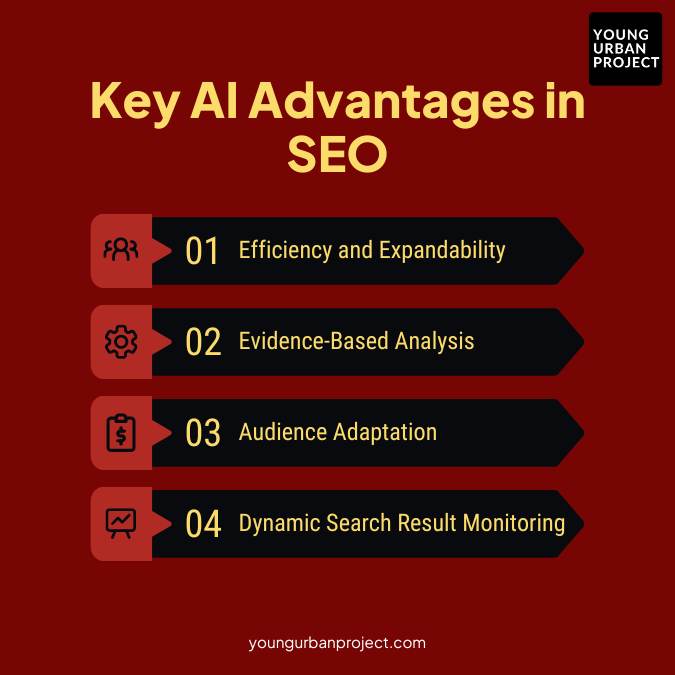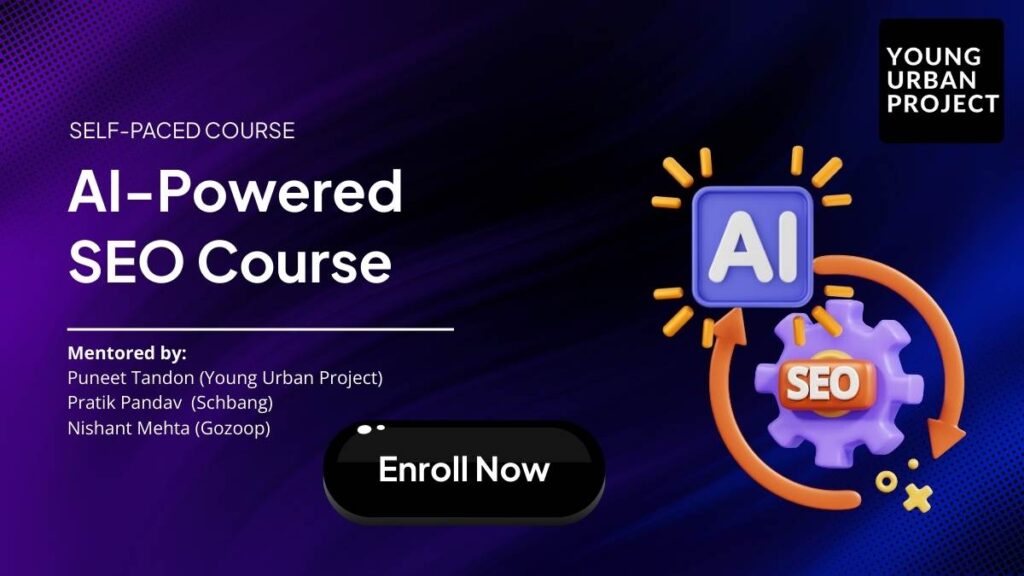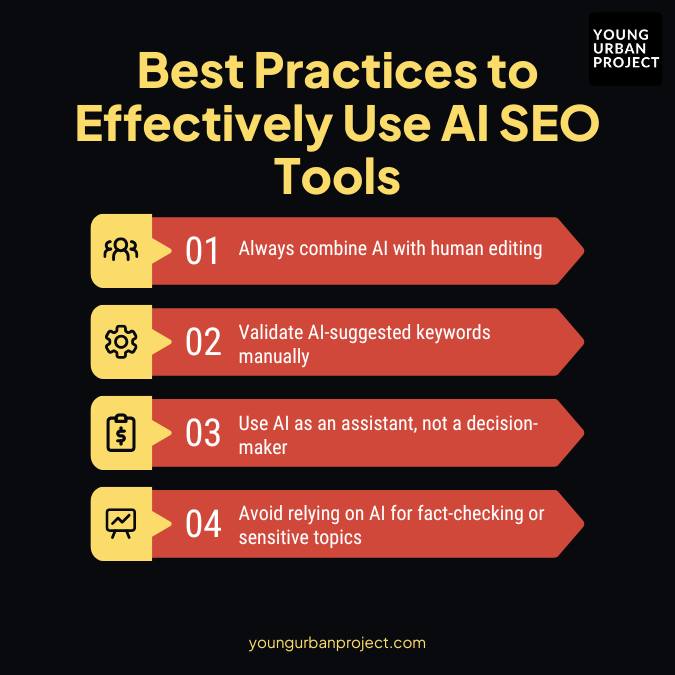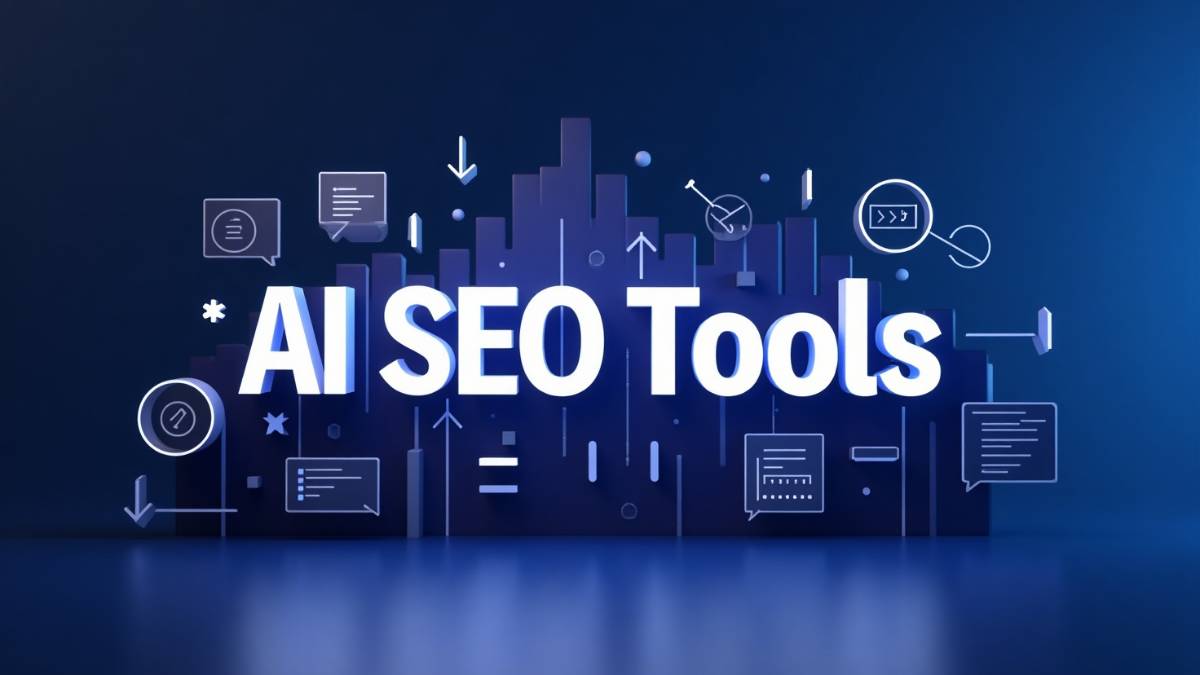Struggling to keep up with Google’s ever-changing algorithms? That’s where AI SEO tools come in. They help you work faster, smarter, and more efficiently, whether you’re a solo blogger or part of a big marketing team. In this guide, we’ll break down what AI SEO tools are, why they matter, and which ones are worth using.
Table of Contents
AI SEO Tool Definition
AI SEO tools leverage artificial intelligence to enhance search optimization processes. These technologies automate traditionally manual tasks, including keyword analysis, content optimization, technical auditing, and performance monitoring.
These systems analyze comprehensive datasets to deliver evidence-based recommendations reflecting current search trends. Specific applications include user intent matching for content development and site architecture improvements.
AI SEO technology reduces speculation in optimization work while increasing productivity, accuracy, and ranking potential.
Key AI Advantages in SEO

1. Efficiency and Expandability
AI technology dramatically reduces task completion time. Operations previously requiring extensive hours now complete within minutes. The technology handles multiple optimization tasks simultaneously, supporting organizational scaling without additional staffing requirements.
2. Evidence-Based Analysis
AI systems operate on factual data rather than assumptions. These tools scan large volumes of websites, search results, and competitor content to uncover successful strategies. Leading optimization platforms utilize data processing to produce specific content recommendations that improve search positioning.
3. Audience Adaptation
AI systems detect user behavior patterns and search trends to predict content needs. This capability enables more relevant content development and improved timing. The technology focuses on understanding search intent beyond simple keyword targeting.
4. Dynamic Search Result Monitoring
Search rankings fluctuate continuously. AI tools track these changes and provide alerts when positions shift. This monitoring allows for timely content updates and issue resolution before significant ranking decreases occur. Systems also identify emerging content trends appearing in top search positions.
Also Read: Ai for Marketing Course
How to Use AI for SEO the Right Way
There are many ways to use AI tools for SEO. But if you use them the right way, they can save you time and help your website do better on Google. Let’s go through each task step by step:
1. Analyze and Match Search Intent
Before writing anything, you need to know what people are really looking for. Are they trying to buy something? Learn something? Or just compare options?
AI tools can read search results and tell you what type of content Google is showing, blog posts, product pages, videos, etc. That helps you write content that actually fits what people want.
2. Optimize Content for E-E-A-T
Google likes content that shows Experience, Expertise, Authoritativeness, and Trustworthiness, that’s Google E-E-A-T. AI can help you spot places where your content looks too thin or weak. It might suggest adding expert opinions, personal examples, or trusted sources. This makes your content feel more real and useful to readers (and Google).
3. Automate Keyword Research
Finding the right keywords by hand takes forever. AI tools can do it fast. You just enter a topic, and they’ll give you a big list of keywords, grouped by theme or intent. Some tools also show how hard it is to rank for each keyword. This helps you pick the ones worth going after.
4. Identify Content Gaps
Let’s say your blog is about skincare, but you missed a few important topics your competitors are covering. It checks your site side-by-side with the top search results. It shows what you haven’t written about yet, these are your “content gaps.” Filling those gaps helps you rank for more keywords.
5. Improve Internal Linking
Linking your pages to each other is good for SEO, but it’s hard to track every link. AI tools can find pages on your site that should be linked but aren’t. They suggest where to add links and even which words to use as anchor text. This makes your site easier for both Google and users to navigate.
6. Detect Technical SEO Issues
Things like broken links, slow pages, or missing meta tags hurt your SEO, but they’re hard to find. AI tools can run a scan on your site and show these problems clearly. Some even fix them automatically. This keeps your website healthy and Google-friendly.
7. Generate and Refresh Content
AI tools can help you write blog posts or product descriptions quickly. You give them a topic or a few keywords, and they generate a first draft. They can also check your old content and suggest updates, like changing titles, adding new info, or improving structure. This helps keep your content fresh.
8. Track SEO Performance with AI
It’s hard to know if your SEO is working without data.You can see your traffic and rankings update instantly with these tools. They show what’s improving, what’s not, and even suggest next steps. Instead of checking everything manually, you get smart reports with clear action points.
Also Read: 20 Best YouTube SEO Tools
Top 12 AI SEO Tools for Smarter Optimization
1. ChatGPT
If you’re stuck or don’t know where to start, ChatGPT is great for brainstorming. You can ask it to give blog ideas, outline your content, or explain what users might be searching for.
Use it for:
- Coming up with content ideas
- Asking what kind of content ranks for a keyword
- Getting help with writing or rewriting text
- Understanding how to match search intent
2. Surfer SEO
Surfer looks at top-ranking pages and tells you what your content is missing. It gives clear suggestions like “add this keyword” or “write at least 1,500 words.” It’s perfect for improving blogs that aren’t ranking well.
Use it for:
- Getting a content score
- Knowing how many times to use each keyword
- Structuring your post like top competitors
- Making sure your content matches what Google wants
Also Read: Handpicked 25 Content Marketing Tools
3. MarketMuse
This tool is like a content planner. These tools show you what your audience wants to know and how thoroughly you should cover each topic. It’s good if you want to build authority on a subject.
Use it for:
- Planning out content topics
- Finding related keywords and subtopics
- Making sure your site covers a topic fully
- Choosing what to write next
4. Frase
Frase helps you create content that answers what people are searching for. It also gives you a quick content brief, so you know what to include in your post without wasting time on research.
Use it for:
- Building SEO-friendly content outlines
- Finding the right questions to answer in your blog
- Writing short, helpful content for Google’s “People Also Ask” section
- Speeding up your writing process
Also Read: 52 Best Affiliate Marketing Tools
5. WriterZen
This tool groups keywords into smart clusters. That means you can create content around themes instead of random keywords. It also shows you which topics are easier to rank for.
Use it for:
- Grouping similar keywords together
- Planning multiple blog posts around one topic
- Checking how competitive each keyword is
- Getting content scores to improve your writing
6. Copywritely
If your content sounds messy or hard to read, Copywritely helps clean it up. It also checks keyword use, grammar, and readability, so your content is SEO-friendly and easy to understand.
Use it for:
- Fixing grammar and readability issues
- Checking if you’ve used keywords too little or too much
- Improving content flow
- Boosts both the clarity and SEO performance of your content.

Enroll Now: AI-Powered SEO Course
7. Alli AI
This one is super helpful if you don’t want to touch code or do technical fixes yourself. Alli AI can go into your site and fix things like meta tags, headers, and links, all with just a few clicks.
Use it for:
- Fixing SEO issues on your site automatically
- Updating content and code without a developer
- Making bulk changes (like meta titles) fast
- Improving on-page SEO without the headache
8. Localo
If you run a local business (like a café, salon, or gym), Localo helps you show up better on Google Maps and local search results. These tools help upgrade your Google Business Profile with actionable tips.
Use it for:
- Getting more local traffic
- Improving your Google Maps listing
- Tracking how many people find you in your area
- Getting simple SEO tasks you can do yourself
Also Read: 15 Best WhatsApp Marketing Software
9. Clearscope
Clearscope helps you write better content by showing what top-ranking pages are doing. It gives you a score and tells you which keywords you missed. Great for blogs, product pages, or guides.
Use it for:
- Writing content that ranks well
- Finding the best keywords to include
- Getting a content score to measure quality
- Making sure your content is complete and clear
10. INK Editor
INK is a writing tool that also gives you SEO help. It shows how well your content is doing in terms of SEO and tone. If your writing is too robotic or too casual, it gives suggestions to balance it out.
Use it for:
- Writing with the right tone
- Getting an SEO score as you type
- Fixing content that’s not ranking
- Keeping your writing natural and optimized
11. NeuralText
This one helps with both writing and planning. It gives you outlines, keyword ideas, and even ready-to-edit drafts. Perfect for handling research, writing, and optimization all in one tool.
Use it for:
- Creating blog drafts fast
- Getting keyword ideas
- Building outlines that match Google results
- Saving time when planning content
12. LinkGraph (GSC Insights)
This tool connects with Google Search Console and helps you track your keyword rankings, backlinks, and SEO issues. It even tells you which backlinks are helping or hurting you.
Use it for:
- Checking how your site is performing
- Finding out which keywords are growing or dropping
- Understanding which backlinks are useful
- Getting smart reports on your SEO health
Also Read: Marketing Planning Software Tools
| Tool | Primary Use Case |
| ChatGPT | Content ideation, SERP research, and prompt-based SEO analysis |
| Surfer SEO | Content optimization with NLP & SERP-based guidelines |
| MarketMuse | AI content planning & topic modeling |
| Frase | Create SEO briefs & answer-based content |
| WriterZen | Keyword clustering, content scoring |
| Copywritely | Content audit, grammar, keyword density check |
| Alli AI | On-page automation, technical SEO fixes |
| Localo | Local SEO AI recommendations for Google Maps |
| Clearscope | Content scoring & optimization suggestions |
| INK Editor | Content optimization with SEO scoring & tone control |
| NeuralText | AI-driven content generation & optimization |
| LinkGraph (GSC Insights) | Backlink AI analysis, GSC integration & keyword ranking tools |
Use Cases: What AI Can Do in SEO
AI isn’t only about blogging—it’s more versatile than that. They can help in many parts of SEO, things that used to take hours or even days can now be done in minutes. Let’s look at what AI can help with:
1. Automate SEO Audits
Normally, checking your website for SEO problems is a long job. You have to look at every page, check links, loading speed, tags, and more. AI tools can do all this in one scan. They check for broken links, missing meta titles, and slow pages, and give you a full list of what’s wrong. Some tools automatically correct or enhance your content.
2. Generate Optimized Blog Outlines
If you don’t know how to start writing a blog, AI can help with that, too. You type in a topic, and the tool gives you a blog outline, like what headings to use, what points to cover, and which keywords to include. This saves time and helps you stay on track while writing.
3. Refresh Outdated Content
Old blogs may stop ranking if they don’t stay up to date. AI tools can read your content, compare it with newer top-ranking pages, and tell you what’s missing. Maybe it’s new keywords, updated info, or better structure. This helps bring old content back to life without rewriting everything.
4. Monitor Competitor SEO Strategies
You can also use AI to spy on your competition (in a legal way). These tools look at what keywords your competitors rank for, what kind of content they’re publishing, and how many backlinks they’re getting. This helps you understand what’s working for them and how you can do it better.
5. Enhance Local SEO with AI Suggestions
If you run a local business, showing up in local search results is super important. AI tools can look at your Google Business Profile, local keywords, and reviews. Then they suggest how to improve, like what info to add, when to post updates, or how to reply to reviews for better results.
6. Improve Click-Through Rate (CTR) with AI Title/Meta Optimization
Even if your page ranks on Google, it won’t get clicks if the title or description is boring. AI tools can write better headlines and meta descriptions based on what gets more clicks. They test different versions and help you pick the one that grabs attention, which means more people will visit your site.
Also Read: Top Performance Marketing Tools
Best Practices to Effectively Use AI SEO Tools
AI tools are helpful, no doubt. But if you just copy-paste what they give, you’re not getting the best results. Here’s how to use AI the right way:

1. Always combine AI with human editing
AI can give you a first draft, but it’s not perfect. It doesn’t always sound natural. After the tool does its job, you should still go through the content. Add your voice. Fix any awkward lines. Make it feel human.
2. Validate AI-suggested keywords manually
AI might throw a list of keywords at you, but not all of them are useful. Check if people are actually searching for those keywords. Use tools like Google Keyword Planner or look directly on Google search. Don’t blindly trust the AI’s list.
3. Use AI as an assistant, not a decision-maker
Think of AI as your helper, not your boss. It can speed things up, give ideas, or organize your thoughts. But you should still decide what to write, how to write, and what strategy to follow.
4. Avoid relying on AI for fact-checking or sensitive topics
AI sometimes makes up stuff, especially when dealing with numbers, health, money, or law. If you’re writing on serious topics, always double-check facts from trusted sources. Don’t just take AI’s word for it. Now, let’s look at the other side of things, the downsides of AI in SEO, and what to do about them.
Also Read: Types of Keywords in SEO
Limitations of AI in SEO (And How to Overcome Them)
AI tools are useful, but they’re not perfect. Knowing where they fall short helps you use them wisely, and avoid mistakes that could hurt your SEO.
1. Can’t Fully Replace Human Creativity
AI writes based on patterns. It doesn’t have real experiences, emotions, or opinions. So, the content can feel too plain or robotic. It won’t tell a personal story, share a fresh idea, or use humor in the right way. That’s something only humans can bring to content.
Solution:
Use AI to build the structure or get rough ideas. But then, add your voice. Share real examples, thoughts, or even mistakes you’ve made. Make it feel like it came from a real person, not a machine.
2. Risk of Generic or Outdated Outputs
AI tools often pull from old data. So, if something new happened recently, the tool might miss it. Also, the way it writes can sound generic, like something you’ve seen on five other websites.
Solution:
After the AI gives you content, look at what’s ranking on Google right now. Then update the content with new info, real-time stats, or links to fresh sources. This will help your content stand out and feel current.
3. Might Miss Search Intent Nuance
Let’s say the keyword is “best running shoes.” Some people want reviews. Some want budget options. Some want expert advice. AI may not always understand which one the user really wants. So, it might give you content that doesn’t match what the person is looking for.
Solution:
Before writing, Google the keyword yourself. Look at the top results. What type of content is showing? What questions are being answered? Then write your content to match that “search intent.” That way, you’ll actually give users what they need.
4. Over-Optimization Issues
AI sometimes throws in the keyword too many times, thinking it’ll help rank better. But Google’s smart. It can tell when you’re trying too hard. Overstuffed keywords make your writing sound fake or forced.
Solution:
Write your content naturally. Don’t worry about the keyword at first. Once your draft feels good, you can go back and add the keyword in 2–3 natural places, like in the title, a heading, and once or twice in the body. That’s usually enough.
Also Read: All Advantages and Disadvantages of SEO
Conclusion
AI is changing how we do SEO. It helps us work faster, find better keywords, write content quicker, and fix websites with less effort. But it’s not perfect. To get the best results, we still need human thinking for creativity, judgment, and real understanding. The smart way forward? Use AI as a helper, not a replacement. Try new tools, stay updated with trends, and always keep your audience in mind. That’s how you’ll stay ahead in the game.
FAQ: Best AI SEO Tools
1. How does AI impact SEO strategy and performance?
AI makes SEO faster and more data-driven. It helps you find good keywords, fix technical issues, and write content faster. This means you can do more in less time. But to really get results, you still need to check things yourself and make sure your content sounds real and useful.
2. What are the best AI tools for SEO content creation?
Some popular ones are ChatGPT (for ideas and drafts), Surfer SEO (for optimization), Frase (for content briefs), and MarketMuse (for topic planning). These tools help with different parts of writing, from start to finish. Try a few and see which one feels right for your workflow.
3. Can AI-generated content rank on Google?
Yes, AI content can rank, but only if it’s helpful, clear, and made for people. Google doesn’t care who writes it. They care if it’s useful. So always edit AI content, add your own insights, and make sure it matches what users are searching for.
4. How do I choose the right AI SEO tool for my business?
Start with what you need help with. Want better content? Try writing tools. Need to fix technical stuff? Use audit tools. Also, look at your budget and how easy the tool is to use. Many tools offer free trials, so test a few before you decide.
5. Is using AI for keyword research accurate and safe?
AI can give you good keyword ideas, but always double-check them with real tools like Google Keyword Planner or Ubersuggest. AI sometimes includes keywords that are outdated or too broad. Use it to get ideas, not final answers.
6. Does Google penalize AI-generated content in SEO?
No, not just because it’s made with AI. Google cares about quality, not the method. If your content is spammy, low-effort, or copied, it might get penalized, whether it’s made by a person or a tool. So, make sure AI content is edited, original, and actually helpful.

